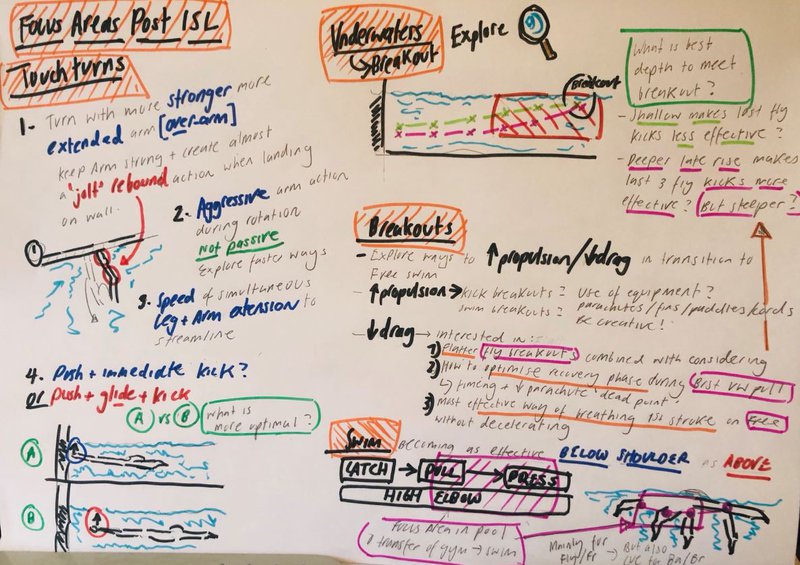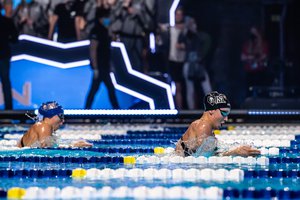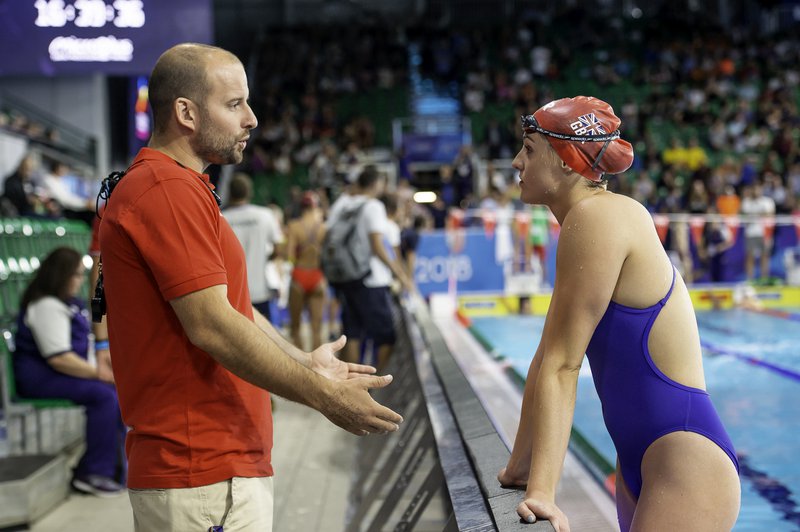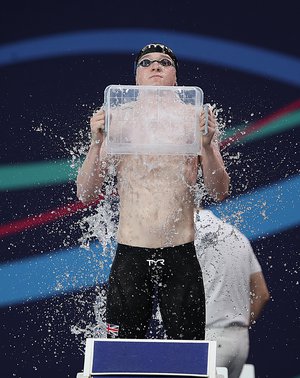David Hemmings' Twitter feed is filled with eye-catching training videos, insightful coaching tips and athlete plans written in pens of every imaginable colour.
Since the start of the first lockdown back in March, the Loughborough National Centre coach has kept that stream of multimedia content coming, regularly tagging in his athletes after a display of impressive technique or an outstanding result at last year's International Swimming League in Budapest, of which there were many.
So what is the thinking behind this extra-curricular role that Hemmings has taken upon himself in the last 12 months?
"When I started doing it, the athletes were quite passionate about it," he says.
"They were being put on social media showing something good in their technique or what they were doing. What I began to see afterwards was that they were passionate about continuing to do it in training, even when they weren't being filmed.
"So the athletes had been put up as an expert on the skill, and that made them more passionate about doing it more consistently in training - so I saw that as a big positive from it."

As David goes on to explain, though, there is more than the one reason for his bespoke use of Twitter - especially in light of the current situation, which continues to keep so many aquatics fans and participants out of the water.
"There's quite a few things to this. I am actually nervous about doing it sometimes, I don't want to be seen to be rubbing it in," explains the Loughborough-based coach, who counts world champion James Wilby, Olympian Molly Renshaw and Abbie Wood - fresh from a brilliant ISL campaign - among his roster of athletes.
"When other people can't swim, there is me sending clips of it. I did think, 'are some coaches or some people going to think 'give it a rest, you can train but we can't'?' I did a bit of asking around and spoke to a few coaches about what their take on it was, and actually everyone I spoke to said, 'we love seeing it, we love seeing great technical examples of the best swimmers that we have in the country'.
"I felt I could make that easier because I have these great examples at my disposal on a daily basis, and I also feel like, from an educational point of view, it was good for swimmers and for coaches to be able to see during this period some of the stuff that was going on, because there was and is an absence of a lot of swimming going on.
"So I was trying to contribute to the education around skill level, and some of the feedback I was getting through private messages and on Twitter was that it was good. Now it's based around trying to communicate with the wider coaching community, to help younger swimmers learn from a skills perspective, as well as making my athletes feel that they were contributing positively and becoming more passionate about the stuff they are doing.

"Even though I'm lucky to be a coach in the National Centre, I'm a club coach at heart. That's where I've done my trade and my time for so many years, and I just feel that's something I'm quite passionate about giving back to."
David's use of Twitter through 2020 and into the new year is only one way he has adapted as a coach during a turbulent, difficult time in sport and wider society.
While the athletes under his charge have been afforded the chance to continue training in the pool for much of the past 10 months, courtesy of the government's Elite Return to Training protocol, there were times when all of Britain's top swimmers were out of the pool and forced into new, unlikely ways of training.
Even when competition returned towards the end of last year, as it did with the thrilling ISL campaign, it required everyone to stay in a bubble environment on Budapest's Margaret Island, with a congested schedule of races and fixtures played out in the one venue.
It is no surprise, then, that Hemmings has learned so much himself - with plenty of those lessons standing him and his athletes in good stead, six months out from the rearranged Olympic Games in Tokyo.
"The first time around, in March, there were so many unknowns and so many uncertainties. What was happening with training? What was happening with competition? What were going to be the effects that this long-term situation was going to cause?" he adds.
"With the unknowns, what I ended up doing was writing plan A, plan B, plan C, plan D, plan E, and then as we moved through, I was like 'well plan A isn't going to happen so cross that off the list, plan C isn't going to happen so cross that one off'.
"In terms of what I have learned, you've had to be so adaptable. There were things cropping up where I felt this isn't traditional, this isn't good! But there was no other way around.

"If you look at the ISL, when would we normally go away for six weeks in an Olympic year, just to compete and swim steady? Traditionally, we'd be building and trying to get the hard yards in to be able to prepare ourselves to move into January and start doing more quality work.
"It felt like this was the opposite way around - but what has happened is we talked about trying to use the ISL to our advantage, trying to arrive there in great shape and saying that if we don't get that many more competitive opportunities, let's really try to make the most of the ones we do get.
"The athletes were very proactive in getting in great shape and using that 30 or 40-day period to really accelerate themselves. I was watching and seeing, 'this is amazing, they are swimming so well for a long period of time'. It wasn't that they did one performance in one week and then were poor afterwards - they held their performances the whole way through. Then they came back and, from a psychological perspective, they are confident, motivated and really thriving off that experience.
"That's something I have picked up from all this. I always knew there was more than one way to skin a cat - but this was really different. What a thing to experience. In an Olympic year, we've done something so different and the athletes actually look like they are better for it.
"As a coach, you'd never have done that yourself without being kind of forced into that situation and having to adapt to it."
Throughout the positivity shared by Hemmings and his Loughborough National Centre athletes, their appreciation at being able to continue training during the turbulence of the past year has never wavered.
In fact, it is something Hemmings believes is driving the swimmers on in the pool and is further boosting their performances.
"We've talked about how lucky we are, the opportunity that we are being afforded to train. I'll honestly say that there has definitely been something present in the athletes that shows how grateful they have been for the opportunity," explains David.
"So if you look at where we've got to now with the ISL performances and then with some really good time trials in December, it shows how grateful they have been, because they wouldn't have produced that standard of performance if they'd just gone through the motions.

"They have made absolutely the best of their opportunity to utilise their training facility, and some of the swims, you may have thought they would struggle, but in some aspects the performances have become even better. The athletes have thrived on the fact that they've had the chance to keep going."
Hemmings' ultimate hope is that this progress will bear fruit on the Olympic stage in July and August. Just how is he feeling at the start of Olympic year 2.0, then?
"I am optimistic. I feel like from a British Swimming perspective, elite sport is being supported. I know this is a really debatable topic because people have been saying that if grassroots sport can't train, why should the elite?" he adds.
"My take on it is that sport is suffering, and the best thing that could happen for the sport is if British Swimming went to Tokyo and had an amazing Olympics. I think that would be the complete kickstart the sport would need for inspiration.
"I feel like I'm on a mission. The swimmers are in a really good place, there are some really exciting performances that have happened.
"I've spoken to all the swimmers and staff at the start of the new year and said, 'we are at a point now where we just look at the next six months. We don't look too far beyond. Just try to make sure that we do the absolute best that we can, and let's try to do something incredible - and hopefully it'll inspire the whole of Britain to want to race back into the sport as soon as people are able to do that'."

